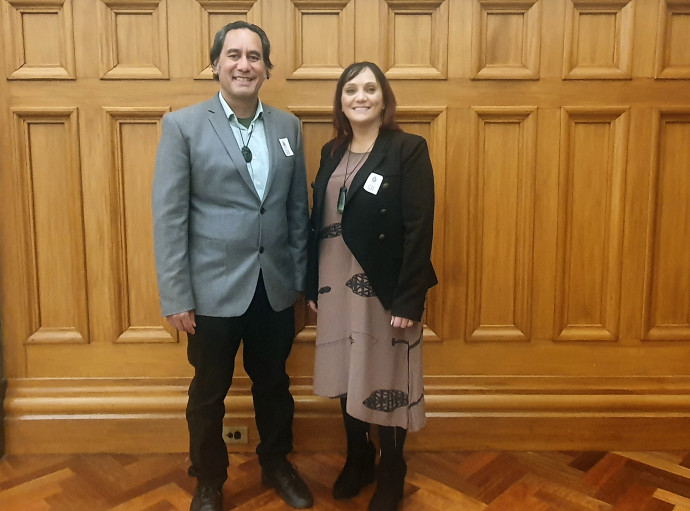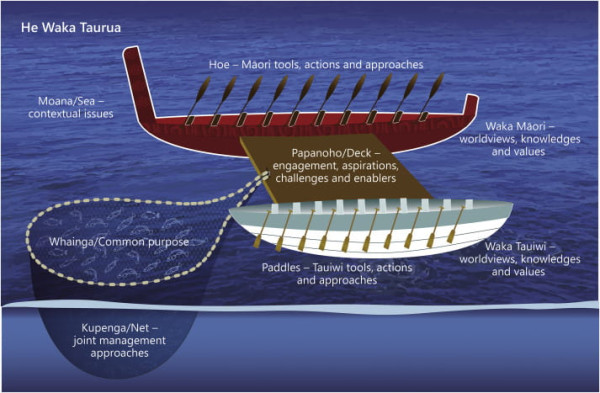Alternative forms of governance for Te Taiao

MPs gathered at Parliament on 10 Here-turi-kōkā August to hear experts discuss research on alternative forms of governance of Te Taiao.
Māori academics Dr Shaun Awatere and Melanie Mark-Shadbolt outlined why alternative forms of environmental governance are urgently needed to address the triple threat of disasters, disease and climate change, as well as the enormous social problems central to the growing issues around environmental degradation. They asked, why, when communities and new actors are already playing critical decision-making roles in how we conserve and sustainably use our natural resources, does the idea of co-governance worry so many? They shared how mātauranga and te Tiriti are already guiding environmental policy and governance and why we need them to continue to.
Read a summary of their talk below and view powerpoint slides from the event.
The triple threat of disasters, disease and climate change need alternative forms of environmental governance
Melanie Mark-Shadbolt (Ngāti Kahungunu, Rangitane, Ngāti Porou, Te Arawa, Ngāti Raukawa, Tūwharetoa, Whakatōhea, Te Āti Awa), Te Tira Whakamātaki co-founder
Dr Shaun Awatere (Ngāti Porou), Manaaki Whenua Landcare Research
On matters of risk and uncertainty
The paper confronts the question of “why are we always arguing about risk?” It explores what drives risk perception in decision-making processes in Aotearoa New Zealand’s coastal and marine environment. Our inquiry is situated in legislation, policy and institutions arising from neoliberal reforms since the 1980s, where two resource management acts, the Resource Management Act 1991 and Exclusive Economic Zone and Continental Shelf Act (Environmental Effects) 2012 were designed to reduce environmental degradation in tandem with economic growth. A pioneering methodology examines consenting processes within each act as strategic sites where risk and uncertainty perceptions are expressed and contested. The methodology makes visible three key influences: the positions of those involved in decision processes, the role of disciplines in circumscribing responses in decision-making and the largely unknown filtering of environmental and economic options that come from three worldviews held in Aotearoa New Zealand (dominant social paradigm, new environmental paradigm, te ao Māori). We argue that unacknowledged and invisible worldviews have a profound impact on environmental practices and outcomes because they underpin and fuel debates around what risk and uncertainties are acceptable and how benefits should be distributed (public verses private benefits/ investment decision and economy versus the environment). Our contention is that unless we recognize and understand these hidden influences, we simply cannot work with them. This insight has major implications for how risk and uncertainty ideas might be framed and navigated in policy.
Le Heron, E., Le Heron, R., Blackett, P., Awatere, S., L., Logie, J., & Hyslop, J. (2022) Why do we argue about risk? The invisibility of worldviews in marine decision-making. Submitted Manuscript
However, please see earlier work below:
Le Heron, R., Lundquist, C. J., Logie, J., Blackett, P., Le Heron, E. L., Awatere, S., & Hyslop, J. (2022). A socio-ecological appraisal of perceived risks associated with mangrove (Mānawa) management in Aotearoa New Zealand. New Zealand Journal of Marine and Freshwater Research, 1-19. https://www.tandfonline.com/doi/full/10.1080/00288330.2022.2097270
He Waka Taurua
Developing equitable marine management systems that recognise Indigenous worldviews, values, and practices, alongside international initiatives such as Ecosystem-Based Management (EBM) are paramount in countries which aim to recognise Indigenous rights. This is the case for New Zealand (NZ) where Indigenous-Māori rights to partner with the Government for the purpose of environmental management were guaranteed under the Treaty of Waitangi, 1840, and subsequent Acts (e.g. Resource Management Act, 1991). Our aim was to explore how both Indigenous-Māori and NZ societal values can be integrated into a marine co-management decision-making framework. Here we describe the Waka-Taurua (double-canoe) framework, and how it can be applied in developing a NZ marine management system (NZ-MMS), which includes both kaitiakitanga (a Māori concept of reciprocal care between Indigenous-Māori people and their territorial environment), and EBM, equitably. We argue that the Waka-Taurua framework can improve how marine co-management systems are developed by facilitating a more structured and equitable discussion of both Indigenous-Māori and broader societal worldviews, values, and practices.

He Waka Taurua
Maxwell, K. H., Ratana, K., Davies, K. K., Taiapa, C., & Awatere, S. (2020). Navigating towards marine co-management with Indigenous communities on-board the Waka-Taurua. Marine Policy, 111, 103722.https://www.sciencedirect.com/science/article/pii/S0308597X19301605
Maxwell, K., Awatere, S., Ratana, K., Davies, K., & Taiapa, C. (2020). He waka eke noa/we are all in the same boat: a framework for co-governance from aotearoa New Zealand. Marine Policy, 121, 104213.https://www.sciencedirect.com/science/article/pii/S0308597X20308599
About the speakers
Melanie Mark-Shadbolt (Ngāti Kahungunu, Rangitane, Ngāti Porou, Te Arawa, Ngāti Raukawa, Tūwharetoa, Whakatōhea, Te Āti Awa), Te Tira Whakamātaki co-founder, is an indigenous environmental advocate and a co-founder and a trustee of Te Tira Whakamātaki, a Māori environmental not-for-profit and home of the Māori biosecurity network. She is also Deputy Secretary Māori Rights & Interests at the Ministry for the Environment. Melanie specialises in understanding and applying mātauranga Māori to biosecurity and biodiversity issues. She has a specific interest in decolonising ideologies of conservation and restoration to address injustices and harm caused to indigenous peoples and our planet. Melanie has won numerous awards and served on many boards and advisory groups.
Dr Shaun Awatere (Ngāti Porou), Manaaki Whenua Landcare Research, supports Māori to manage collective assets in a more sustainable manner consistent with the kaupapa-Māori principles of kaitiakitanga, manaakitanga and whakatipu rawa. He is engaged in research and policy to help prepare iwi/hapū Māori for climate change mitigation and adaptation planning. Shaun contributed to a recent publication summarising the latest research and guidance surrounding observed and projected climate change impacts on whānau/hapū/iwi and Māori business in Aotearoa-New Zealand. This research provides commentary about risk and uncertainty, knowledge gaps, and mitigation and adaptation options.
